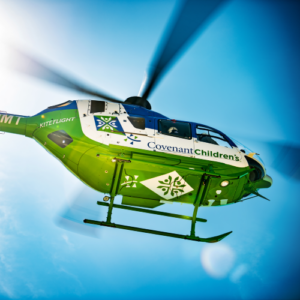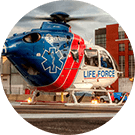Jennifer Hayes was 32 years old and pregnant with her second child (to be named Micah) when she collapsed into cardiac arrest in her home. Her husband Kyle heard her fall and attempted to arouse her to no avail. He called 911 and units from Riverside Fire Department were dispatched…
Panicked, her husband ran across the street to a seek help from a neighbor who was a police officer. He pounded on the door repeatedly, but no one answered, so he returned home and began compressions on his wife.
The neighbor had heard the pounding, but no one was there when he opened the door. Luckily, Jennifer’s husband had left his front door open when he ran home. The neighbor saw it open and decided to run over to investigate. He found CPR underway and assumed compressions until the fire department arrived.
Jennifer received exception BLS and ALS care over the next 15 minutes by the Riverside Fire Department crews and was converted from Ventricular Fibrillation after two shocks and ALS medications.
A REACH Helicopter was used to rapidly transfer Jennifer to UCI Medical Center where they feared she had suffered from eclampsia, a very rare, life-threatening condition during pregnancy (fewer than 20,000 cases per year in U.S.) characterized by the development of seizures.
The decision was made to do an immediate emergency C-section. The result was a premature male child who required intubation.
Jennifer was then therapeutically cooled for several days. Micah was transferred to the Neonatal ICU at CHOC where Jennifer was the resuscitation coordinator.
Micah is now two-years-old and has developed in a normal manner, with no deficits. The Cardiac Arrest Survivor Summit was introduced to Micah in a surprise visit on stage. There wasn’t a dry eye in the audience as Jennifer thanked all of the individuals and crew involved in her resuscitation, from her neighbor, the dispatcher on duty, Riverside Fire crews, ED staff at the local hospital she was initially transported to, the REACH helicopter crew that transported her to CHOC Children’s Hospital and, of course, the staff and specialists at CHOC Children’s that resuscitated and care for her and Micah.
Frequently Asked Questions:
If an AirMedCare Network Provider does not transport you, you will be responsible for payment. Our membership program only covers transports provided by our affiliates.
There is no limit to the number of transports a member may take in a year. Each transport is handled the same way and must be an emergent or time-sensitive transport as determined by a physician (or other appropriate provider) or first responder unaffiliated with AMCN.
With an AirMedCare Network membership, any person or persons who reside under one (residential) roof are covered. In the event we have a member who lives in a duplex or apartment complex, we designate the primary member’s residence/address— that is considered the “one roof”. Undergraduate college students can be covered under their parent’s membership as well as anyone previously residing in the household who is then moved to a permanent care facility.

Prepare for Travel with Expert Pre-travel Health Tips
Pre-travel health care is important for both domestic and international trips. It helps ensure you are ready to handle any common health problems that might

Neonatal Intensive Care – Be prepared for baby with this important information.
Having a child can be both exciting and a little scary. New parents want to be ready for their baby’s arrival and make sure they

Snowbirds and Expats Should Consider Air Medical Membership
Each year, millions of Americans spend the winter months in sunnier locales like Florida, Nevada and Arizona. Unfortunately, illness or injury during travel can lead




